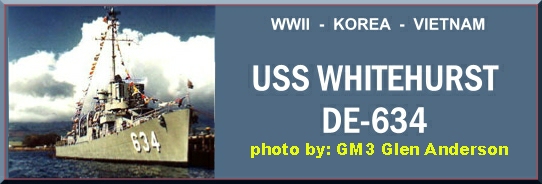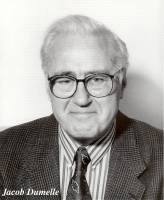|
Walking on the Bulkheads and Perils of a Panama Canal Transit
and other Stories
by: Jake Dumelle Radio Technician in the second crew now Lt Cmdr USNR
The Whitehurst headed back to the states from Guam in early 1946. I can't recall whether we were accompanied by any other ships.
We hit a siege of high winds and waves. I saw the inclinometer and, if my memory is correct, we were rolling 57 degrees from vertical. We literally walked on the bulkheads as they rolled underfoot. Every manual on my "Radio Technician's Shelf" fell to the deck of the Radio Shack. Dishes in the galley were shattered. The CO ordered all hands to wear their life jackets.
We made it thru the storm and moored in San Diego. The Panama Canal would be our next adventure.
The Perils of a Panama Canal Transit
This great canal was opened in 1914. The Whitehurst almost closed it in 1946.
We initially moored at a base near Panama City. The crew was observing the "Port & Starboard" liberty procedure in which half of the ship's sailors could go ashore at a time. Thus half the crew could be ashore drinking while the other half, supposedly carried out their duties aboard. But, in fact, the crew had access to beer on the base so the "duty crew" was drinking too.
We were never told that Panamanian Beer had a higher alcohol content than the American Beer we usually drank, i.e. Iron City, Fort Pitt, and Schaefer. (Note: It was said that the best American Beers, namely Schlitz, Pabst, and Blatz, were reserved for submariners.) You can guess the rest. The entire ship's company got soused. One crewman, returning from liberty, actually got down on hands and knees to negotiate the gangway.
The next morning, Whitehurst headed into the northwest leg of the canal. At the locks, we were lifted the 85 feet into the fresh water of Lake Gatun. Most ships flush their bilges on Lake Gatun, and take fresh water aboard. I assume we did also. As we approached the point where we had to turn to due north, high cliffs came into view. A turn to starboard was required. The skipper (or the pilot) gave the order to the helmsman, "starboard one quarter". Nothing happened, and cliffs loomed closer. "Starboard one half" was the next command. Still the ship's heading didn't change. Finally the command, "Full Starboard!". The bow slowly inched around and we avoided the cliffs. We didn't sink in the canal.
Later we learned what had happened. The Whitehurst was powered by steam turbines turning generators which supplied electricity to motors spinning twin shafts and propellers. There was a problem with the port drive. With only the starboard screw turning, the ship naturally tended to turn to port making the starboard rudder commands less effective. Somehow this information wasn't relayed from the engine room to the bridge. It was a narrow miss!
Jocko the Whitehurst's Mascot
by Jake Dumelle
One of the quartermasters had a pet monkey named
Jocko. I can't recall if it was male or female. While men were
on watch, Jocko would sit on a sailor's shoulder. When she got
tired, she would borough into someone's shirt and sleep. Sometimes
it pooped on the signal bridge. I kept in touch with Jocko's owner
after we were discharged. He later told me that the monkey was
attacked by a a dog and had to be put down.
Doug Smith's memories of Jocko.
Doug Smith remembers the monkey as a female who would jump around from
head to head among the men gathered on the fantail for evening
movies. The was a coffee can full of old clock parts, gears,
etc. If a sailor told Jocko to put the watch together she would pick
around in the parts as if she really could put it together.
Like any self respecting female, Jocko did not like
to be called "bitch". If a sailor called her
"bitch" she would literally rip his shirt off. It was a
common joke to pull on a new crew member or visitor, to get him to call
the monkey "bitch" and then laugh as she tore at the mans shirt.
Strange Custom?
by Jake Dumelle
When I first reported aboard Whitehurst, it was near
noon. I dropped my gear on my assigned bunk and went to chow.
At the steam line, I had my tray compartments filled. As I sat I
noticed a strange ritual. Each sailor would hold up a slice of bread
and stare at it. Since I had never heard of this practice, I assumed
it was some local custom that they didn't tell us about in boot
camp. I held up my bread slice and rotated it. After a time I
spoke to someone at the table, "Why are they holding the bread
up?" I asked. A sailor replied, "That to look for the
maggots from the flour."
The Effect of a "Dear John" Letter
by Jake Dumelle
Some of the crew had sweethearts back in the
states. One of the crew got a "Dear John" letter from his
girl, dropping him for someone stateside.
He went ashore with a liberty crew, probably to
Hoover Beach which was a Navy recreational area. One could buy beer
for a dime a bottle however one was issued only two beer tickets per
trip. The crewman who got the Dear John, convinced some others to
give him their beer tickets. He got roaring drunk. When the
liberty crew returned to Whitehurst which was anchored in the
harbor at Guam, he went below to the sleeping compartments and began
choking crew members in their bunks. He was subdued by shipmates and
the pharmacist gave him an injection to knock him out. When he sobered up,
there was no violence left in him.
Thank Heaven we were not underway.
|

